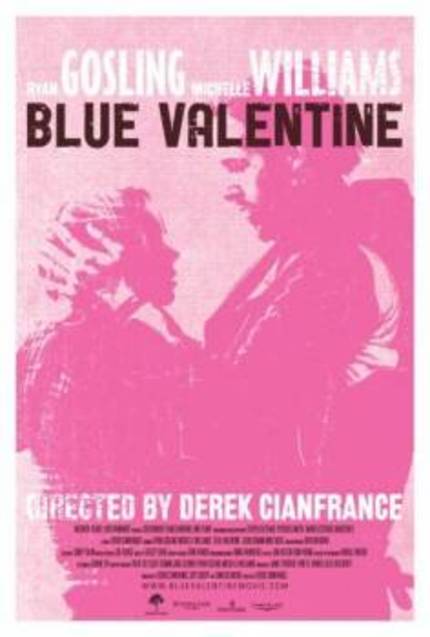PFF 2010: BLUE VALENTINE REVIEW

"This is not a love story."
Blue Valentine is a deconstruction of a relationship gone wrong and the entire genre of romance pictures. Like Summer, it jumps back and forth at different points within the relationship documenting both the blissful beginning and bitter end.
The main difference between Valentine and Summer, is that Valentine fulfills on its promise. Ultimately, 500 Days of Summer becomes a traditional Hollywood romantic comedy. While there were poignant moments within that film, its ending is far too clean and tidy. Everyone got what they needed in the end. While most relationships eventually do fall apart, the message adhered to classic Hollywood schmaltz. "We are all fated to find what we really deserve." At least, as long as we're as attractive as Joseph Gordon Levitt and Zooey Deschanel" How nice... GAG!
There is little hope and no joy in the end of Blue Valentine. You will witness a relationship crumble and it's messy, raw, and real. There are no cute montages or sementializing. This is a true anti "romantic comedy" that eschews any magical whimsy inherent to the genre. Fated love doesn't exist in the world of Derek Cianfrance's directorial debut.
Ryan Gosling and Michele Williams give courageous and Oscar worthy performances as Dean and Cindy in a daringly original film that's well worth seeking out. But this may also leave many unsatisfied as it doesn't fully work as a narrative feature. Ultimately, the film does not contain any type of actual storyline. There's a beginning and an end, but the film forgoes the middle. We see tender moments at the start of the relationship juxtaposed with the ugly and vicious mind games played out during the final days of a marriage. But we never see the actual deterioration of the relationship. We don't know how it is that things came to fall apart. We're only left with assumptions.
This is both the film's strongest and weakest aspect. Everything feels so authentic that anyone who's been a bad longstanding relationship will relate, or anyone who's gone through an ugly divorce involving a child, or if you are the child of a broken home. Mostly everyone is going to identify with one of these characters, but viewers will likely substitute the large gap in Dean & Cindy's story with their own experiences.
This makes for dangerous viewing. The film doesn't take sides in the fighting we see, nor should it, but most audience members clearly will and it will likely be gender related. I've already been witness to couples violently arguing over which character was to be blamed over the fallout in the relationship. The truth is, both characters play an equal role.
Since the film gives us little information or context for many of the scenes, any discussion or debate that can be made is going to be based purely on personal bias. This is an intriguing decision and makes for a personalized and intimate experience that will be different for every viewer. But it also leaves the film standing as more of an experiment than an actual narrative.
As a fellow filmmaker pointed out, "Blue Valentine is pretty much an actors' workshop exercise stretched out for 90 minutes." But you're witnessing two incredible actors at the top of their game. It's compelling enough that the film never feels strained or tedious.
Although the majority of the film was improvised on set by the two leading actors, Derek Cianfrance should be commended for shooting and editing the picture in a fashion that still feels cinematic. Many are bound to label this within the mumblecore genre. I'm not sure if I entirely agree with that. But in that case, it's a damn pretty and expertly shot mumblecore film. But, like an Andrew Bujalski film, this is rooted in hipster culture. The catchy and up tempo Grizzly Bear song that plays during the credits immediately following a heart wrenching scene feels forced and ill fitted. And many audience members simply hated the characters in the film which I suspect was primarily based on the way Ryan Gosling was dressed. Both characters are essentially stubborn, narcissistic people. These are character traits that seem to have become even more prominent in younger generations. The specific details on how these two act and interact are timeless though. Still, Dean looks like the type of douchebag prick who hangs out in Williamsburg, New York, purposefully dresses like a bum to be ironic, and carries around a ukulele. He looks like the the kind of asshole who poses for pictures in The Village Voice or Vice Magazine. But again, the sheer sincerity and intensity of the performances were enough that I could overlook all of that.
It's now impossible to review this without mentioning the MPAA's insanely idiotic decision to stamp an NC-17 on the picture. The film was already unlikely to receive a wide release, this is strictly art house fare, so the rating will hardly effect the film's distribution but it continues to prove just how misogynistic the MPAA's stance on sex seems to be. The sex is never gratuitous, nor is overtly explicit. But it does feel real. Once again, a film has been deemed obscene because a woman has a realistic orgasm on screen. We all know by now, that women aren't allowed to get off in a film. Unless someone comes in and brutally murders them afterward.

Do you feel this content is inappropriate or infringes upon your rights? Click here to report it, or see our DMCA policy.






